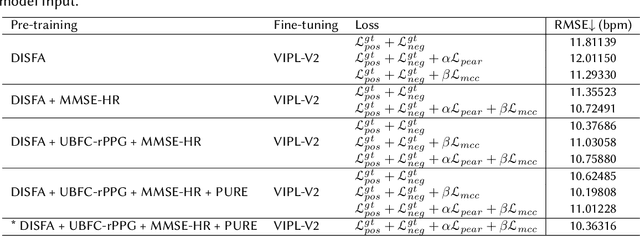Joint Spatial-Temporal Modeling and Contrastive Learning for Self-supervised Heart Rate Measurement
Paper and Code
Jun 07, 2024



This paper briefly introduces the solutions developed by our team, HFUT-VUT, for Track 1 of self-supervised heart rate measurement in the 3rd Vision-based Remote Physiological Signal Sensing (RePSS) Challenge hosted at IJCAI 2024. The goal is to develop a self-supervised learning algorithm for heart rate (HR) estimation using unlabeled facial videos. To tackle this task, we present two self-supervised HR estimation solutions that integrate spatial-temporal modeling and contrastive learning, respectively. Specifically, we first propose a non-end-to-end self-supervised HR measurement framework based on spatial-temporal modeling, which can effectively capture subtle rPPG clues and leverage the inherent bandwidth and periodicity characteristics of rPPG to constrain the model. Meanwhile, we employ an excellent end-to-end solution based on contrastive learning, aiming to generalize across different scenarios from complementary perspectives. Finally, we combine the strengths of the above solutions through an ensemble strategy to generate the final predictions, leading to a more accurate HR estimation. As a result, our solutions achieved a remarkable RMSE score of 8.85277 on the test dataset, securing \textbf{2nd place} in Track 1 of the challenge.
 Add to Chrome
Add to Chrome Add to Firefox
Add to Firefox Add to Edge
Add to Edge